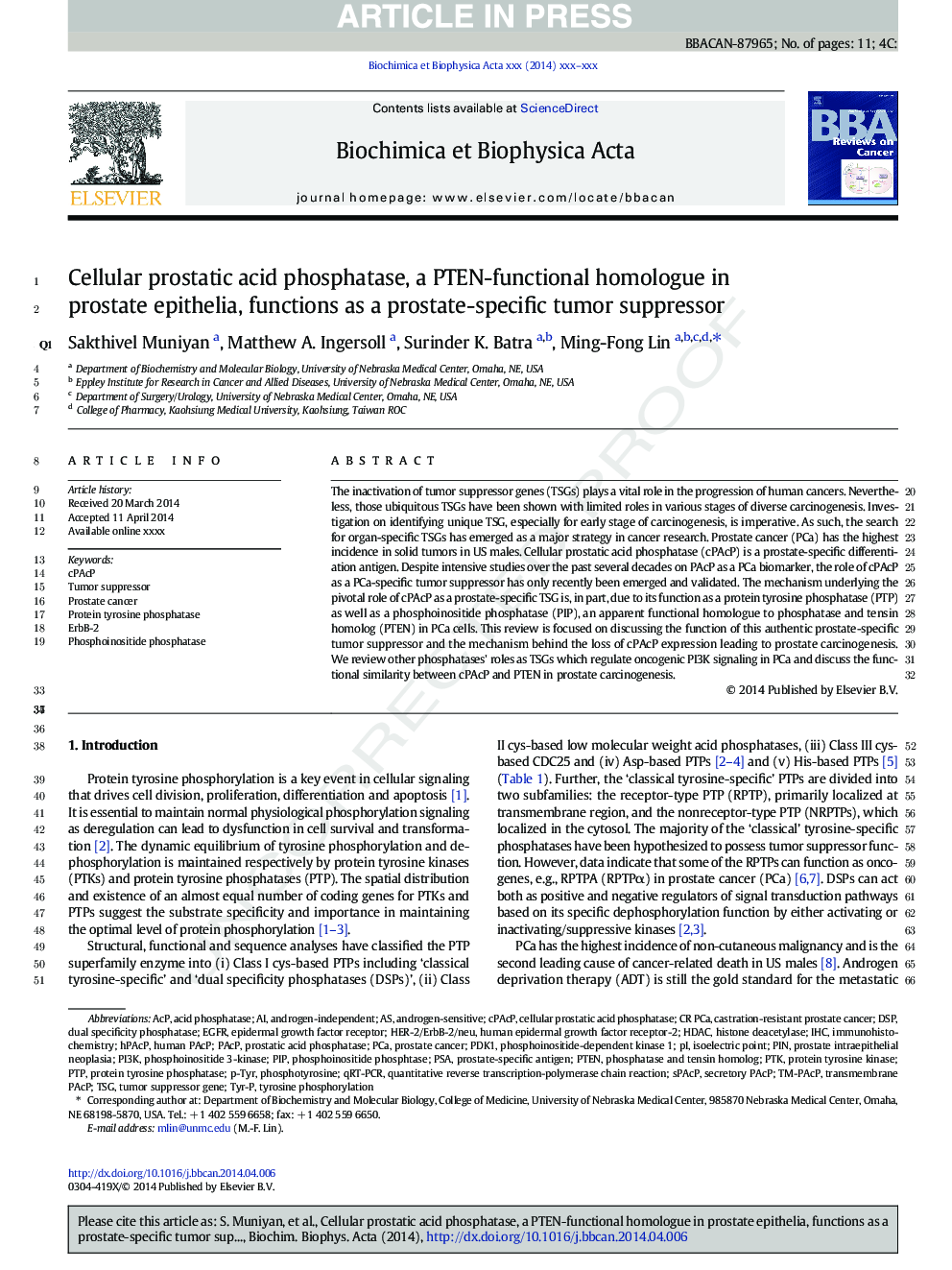| کد مقاله | کد نشریه | سال انتشار | مقاله انگلیسی | نسخه تمام متن |
|---|---|---|---|---|
| 10895591 | 1083085 | 2014 | 11 صفحه PDF | دانلود رایگان |
عنوان انگلیسی مقاله ISI
Cellular prostatic acid phosphatase, a PTEN-functional homologue in prostate epithelia, functions as a prostate-specific tumor suppressor
دانلود مقاله + سفارش ترجمه
دانلود مقاله ISI انگلیسی
رایگان برای ایرانیان
کلمات کلیدی
DSPPDK1TSGErbB-2PTPqRT-PCRHDACACPPTKPSAPI3KP-TyrEGFRPCA - PCAandrogen-independent - آندروژن مستقل استacid phosphatase - اسید فسفاتازIHC - ایمونوهیستوشیمیImmunohistochemistry - ایمونوهیستوشیمیdual specificity phosphatase - خصوصیات دوگانه فسفاتازProstate cancer - سرطان پروستاتCastration-resistant prostate cancer - سرطان پروستات مقاوم به کاستاریکاTumor suppressor - سرکوبگر تومورphosphatase and tensin homolog - فسفاتاز و تنسین همولوگphosphotyrosine - فسفاتیزینTyrosine phosphorylation - فسفوریلاسیون تروفوزینphosphoinositide 3-kinase - فسفینوزیتید 3-کینازProstate intraepithelial neoplasia - نئوپلاسی داخل صفاق پروستاتIsoelectric point - نقطه ایزوالکتریکhistone deacetylase - هیستون داستیلازphosphoinositide-dependent kinase 1 - وابسته به فسفوئینوزیتید کیناز 1quantitative reverse transcription-polymerase chain reaction - واکنش زنجیره ای رونویسی معکوس و پلیمریزا معکوسprostate-specific antigen - پادگن مخصوص پروستاتProtein tyrosine phosphatase - پروتئین تیروزین فسفاتازProtein tyrosine kinase - پروتئین تیروزین کینازProstatic acid phosphatase - پروستات اسید فسفاتازPIN - پینPiP - پیپPten - ژن PTENTumor suppressor gene - ژن سرکوب کننده تومورEpidermal growth factor receptor - گیرنده فاکتور رشد اپیدرمالHuman epidermal growth factor receptor-2 - گیرنده گیرنده فاکتور رشد اپیدرمی انسان 2
موضوعات مرتبط
علوم زیستی و بیوفناوری
بیوشیمی، ژنتیک و زیست شناسی مولکولی
تحقیقات سرطان
پیش نمایش صفحه اول مقاله

چکیده انگلیسی
The inactivation of tumor suppressor genes (TSGs) plays a vital role in the progression of human cancers. Nevertheless, those ubiquitous TSGs have been shown with limited roles in various stages of diverse carcinogenesis. Investigation on identifying unique TSG, especially for early stage of carcinogenesis, is imperative. As such, the search for organ-specific TSGs has emerged as a major strategy in cancer research. Prostate cancer (PCa) has the highest incidence in solid tumors in US males. Cellular prostatic acid phosphatase (cPAcP) is a prostate-specific differentiation antigen. Despite intensive studies over the past several decades on PAcP as a PCa biomarker, the role of cPAcP as a PCa-specific tumor suppressor has only recently been emerged and validated. The mechanism underlying the pivotal role of cPAcP as a prostate-specific TSG is, in part, due to its function as a protein tyrosine phosphatase (PTP) as well as a phosphoinositide phosphatase (PIP), an apparent functional homologue to phosphatase and tensin homolog (PTEN) in PCa cells. This review is focused on discussing the function of this authentic prostate-specific tumor suppressor and the mechanism behind the loss of cPAcP expression leading to prostate carcinogenesis. We review other phosphatases' roles as TSGs which regulate oncogenic PI3K signaling in PCa and discuss the functional similarity between cPAcP and PTEN in prostate carcinogenesis.
ناشر
Database: Elsevier - ScienceDirect (ساینس دایرکت)
Journal: Biochimica et Biophysica Acta (BBA) - Reviews on Cancer - Volume 1846, Issue 1, August 2014, Pages 88-98
Journal: Biochimica et Biophysica Acta (BBA) - Reviews on Cancer - Volume 1846, Issue 1, August 2014, Pages 88-98
نویسندگان
Sakthivel Muniyan, Matthew A. Ingersoll, Surinder K. Batra, Ming-Fong Lin,